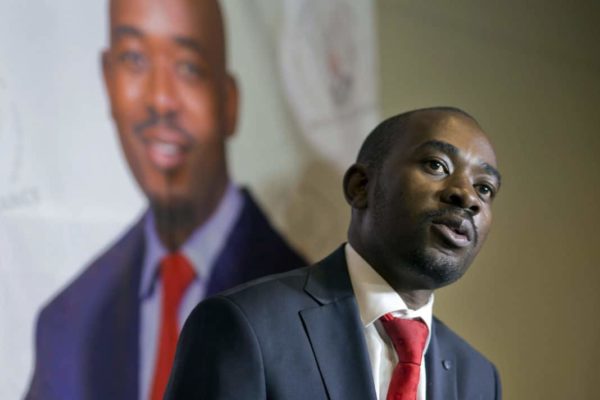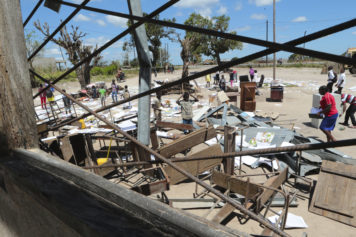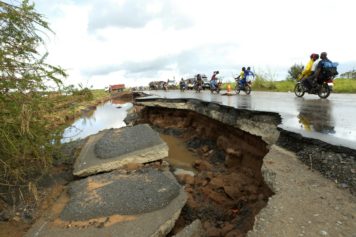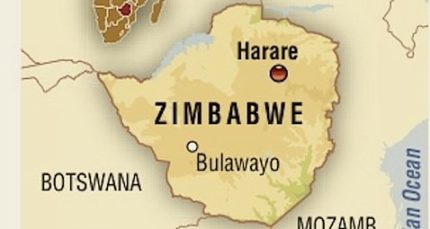
Zimbabwean’s main opposition candidate Nelson Chamisa speaks at a news conference in Harare, Zimbabwe, Thursday Aug. 2, 2018. (AP Photo/Jerome Delay)
HARARE, Zimbabwe (AP) — The ruling party and the main opposition group both declared Thursday they won Zimbabwe’s presidential election ahead of an imminent announcement of the official result, deepening a political crisis that was worsened by deadly rioting in the capital.
The death toll from street clashes Wednesday rose to six, with 14 injured, police said, and 18 people were arrested at the offices of the main opposition party amid tensions over a vote that was supposed to restore trust in Zimbabwe after decades of rule by Robert Mugabe.
There were conflicting accounts of who was responsible for the bloodshed in the capital of Harare, which followed opposition protests of alleged vote-rigging. Police tried to disperse angry crowds with tear gas and water cannons, and then soldiers fired live rounds.
While the military has been criticized for the crackdown, police spokeswoman Charity Charamba blamed rioters, saying some were drunk and that they destroyed eight cars and 22 shops. About 4,000 opposition supporters, some carrying iron bars and stones, were “besieging” downtown Harare, she said.
President Emmerson Mnangagwa and his ruling ZANU-PF party also accused the opposition of inciting the violence. The opposition, human rights activists and international election observers condemned the “excessive” force used against protesters and appealed to all sides to exercise restraint.
The Zimbabwe Electoral Commission said it will start announcing results of Monday’s presidential election at 10 p.m. (2000 GMT, 4 p.m. EDT), though by law it has five days to deliver the final tally. It has sometimes given conflicting statements about when it is releasing information.
International election observers urged the commission to reveal the presidential results as soon as possible, saying delays will increase speculation about vote-rigging.
Meanwhile, police raided the Movement for Democratic Change party headquarters of the main opposition candidate, Nelson Chamisa. A lawyers’ group said he was being investigated by police for allegedly inciting violence.
Chamisa, opposition politician Tendai Biti and several others are suspected of the crimes of “possession of dangerous weapons” and “public violence,” according to a copy of a search warrant, which was seen by The Associated Press. The warrant authorizes police to search for and confiscate any evidence as part of their investigation.
The authenticity of the warrant was confirmed by Kumbirai Mafunda, a spokesman for Zimbabwe Lawyers for Human Rights.
Chamisa, however, said the police who raided his headquarters and seized computers were looking for what he called evidence of vote-rigging. The evidence already had been moved to a “safe house,” he said.
Opposition demonstrations had broken out after electoral officials said the ruling party had won a parliamentary majority in the elections, and Paul Mangwana, a ZANU-PF spokesman, told a news conference he anticipated similar success in the presidential race.
Elsewhere in Harare, Chamisa said he was confident that his MDC party would be forming the next government.
As the rival camps sparred over the outcome, they also appealed for calm. Mnangagwa said his government was in touch with Chamisa to try to ease tensions, although the opposition leader said he had not received any communication.
During the 37-year rule by Mugabe, who resigned in November under military pressure, elections were marked by violence against the opposition and alleged fraud, and international sanctions were imposed on Zimbabwe as a result. A credible vote is crucial to the lifting of the sanctions so that the collapsed economy can recover.
Monday’s balloting was called free and fair by the electoral commission.
The European Union observer mission expressed “serious concerns” as representatives of Western and other groups gave their first assessments of the election.
Former Liberian leader Ellen Johnson Sirleaf, the lead observer of a U.S. monitoring mission, also had expressed concern about delays in announcing results, saying that the longer it went on, “the more it calls into question the population’s confidence in the election process.”
Mnangagwa, who is close to the military, called for an “independent investigation” into the riots, saying those responsible “should be identified and brought to justice.”
The military deployment was the first time that soldiers had appeared in the streets of the capital since Mugabe’s resignation. At that time, thousands of jubilant residents welcomed their presence.
Some Harare residents expressed frustration and exhaustion at the violence.
“We are a peaceful nation,” said 29-year-old Sifas Gavanga. “We don’t deserve the death we saw.”


